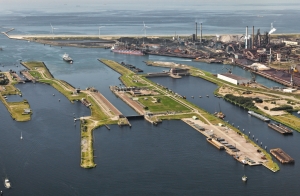


(Posted on 21/09/20)
Transhipment in the seaports in the North Sea Canal region - Amsterdam, IJmuiden, Beverwijk and Zaanstad - fell by 10.7% to 48.7 million tonnes (2019: 54.6 million) in the first six months of this year. The impact of the global corona virus crisis on the transhipment figures is clear.
Transhipment also fell in the port of Amsterdam during the first six months of 2020. The volume declined from 45.2 million tonnes in the first half of 2019 to 39.8 million tonnes this year (-12%). This drop was also clearly a result of the coronavirus pandemic.
Koen Overtoom, CEO of Port of Amsterdam, says: "For the first time in years we have seen a reduction in the transhipment in our port. And it is a significant one. However, we are not pessimistic."
"In the first half of the year, we have shown in difficult conditions how crucial the port is for the region and for the country. As vital infrastructure, we have continued to manage shipping traffic and to handle cargo flows, without letup. We have thereby contributed to keeping the country and the economy running."
"Our distribution clients in particular have had a strong six months, with the distribution of foodstuffs and packages. The market for transport fuels (petrol, kerosene etc.) is now recovering."
"It is hard to say what the second half of the year will look like. The fuels market is too fickle for that, and the impact of the coronavirus is uncertain. We do anticipate that in the current conditions the shortfall in volume for the year as a whole, will remain limited to the level that we have seen in the first six months," says Overtoom.
The decline in Amsterdam in the first six months was attributable to both dry and liquid bulk and containers.
The volume of dry bulk fell by 21.2%. This was in particular due to a substantial decline in coal to 4.6 million tonnes, compared to 8.2 million tonnes last year (-43.6%). The unexpected, non-structural growth last year amplified the decline in coal volume this year. The transhipment of grains also fell (-15.4%), and there was a reduction in break bulk (-18.2%).
Container transhipment fell by 31.6%.This cargo flow had grown steadily in recent years, partly as a result of the focus of the port of Amsterdam on short-sea lines. The decline can therefore also be attributed to the coronavirus, which resulted in scheduled services being partly suspended.
Transshipment in IJmuiden fell slightly, by only 3.4% to 8.76 million tonnes. In Beverwijk the transshipment volume fell by 44.3% to 194,000 tonnes, and Zaanstad saw a 15.3% increase in transshipment to 84,000 tonnes.
Euroports has announced the renewal of the concession for Terminal Rinfuse Venezia (TRV) at Porto Marghera... Read more
Contributing to the commitment of achieving net zero emissions by 2050, the Panama Canal authority has... Read more
The Saguenay Port Authority in Quebec has ordered a Konecranes Gottwald ESP.6B Mobile Harbor Crane for... Read more
North Sea Port Supervisory Body has appointed Cas König as the port authority's new CEO. Kö... Read more
After 19 years at the helm of the Port of Trois-Rivières and a career rich in major projects,... Read more
Abu Dhabi based AD Ports Group, an enabler of integrated trade, transport and logistics solutions, has... Read more
The Port of Rotterdam and Port of Antwerp-Bruges have welcomed the Clean Industrial Deal, through which... Read more
The Canadian Port of Trois-Rivières is delighted to have received major funding of $87.1 million... Read more
Belgian logistics giant Katoen Natie has ordered four all-electric Konecranes Gottwald Mobile Harbor... Read more
AD Ports Group, Abu Dhabi based enabler of integrated trade, transport and logistics solutions, has... Read more